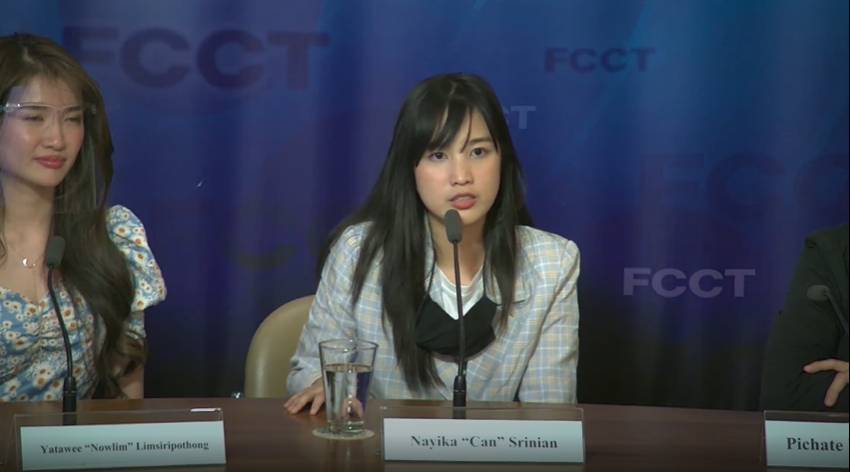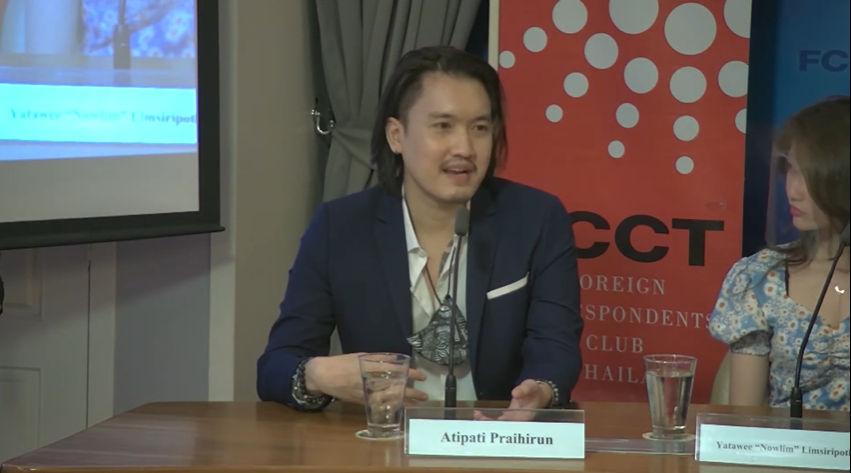While members of idol girl groups such as BNK48 are seen as products and are expected to be voices for the society, they neither see themselves as objectified nor obligated to advocate for social issues, but they have to adapt to a mixture of Thai and Japanese idol cultures. Idol insiders also explain the business model and its origins.

The panel, from left: Atipati Praihirun, Yatawee Limsripothong, Nayika Srinian, and Pichate Yingkiattikun
On 10 July, the Foreign Correspondents' Club of Thailand (FCCT) held a panel on idol culture in the Thai context, especially amid Covid-19. The panel consisted of Cm Cafe member Yatawee “Nowlim” Limsiripothong, former BNK48 member Nayika “Can” Srinian, idol analyst Pichate Yingkiattikun and FEVER founder Atipati Praihirun.
In Japanese culture, idols are singers, actors and dancers who sell their creative works, personality and appeal. It was developed from the “Cool Japan” policy adopted by the Japanese government after World War II to improve the country’s economy and national image through the distribution of Japanese pop culture.
Pichate explained that the industry reached its peak after the birth of the idol girl group AKB48. Idol culture reached Thailand in 2016 with the debut of AKB48's sister band, BNK48. While the idols must do what Japanese idols do, Pichate explained that they had to adjust to Thai culture as Thai people perceive idols as role models who have to set a good example for society, not just as entertainers.
Idol culture is all about business and marketing

Pichate Yingkiattikun
“Many might define idol girl groups as another genre of music, but for me, idols are business,” Pichate said.
Similar to alternative music, which contains rock, pop and jazz, idol girl groups might contain synth-pop, Pichate explained.
The turning point of BNK48 was the success of the song “Fortune Cookie” on their second album with more than 100 million views on YouTube. This is viewed as the Golden Age that generated more idol music and many idol groups.
The challenge faced by BNK48 is that they must translate Japanese songs into Thai. So one of the factors which determine the success of a song is its adaptability to the Thai context. For example, Pichate explained, Japanese songs usually narrate the events but when translated into Thai they sound ridiculous.
Another challenge is that idol groups are closely tied to the state of the economy. People may buy one CD to listen to the music, but the idol group industry revolves around making the CDs more valuable, such as by including a ticket to a handshake event. But as Thailand is facing an economic recession, idol groups and their stakeholders face an even greater challenge in how to deal with the situation.
Since the global pandemic, Atipati sees that conditions under the “new normal” might bring about new activities from face-to-face fan meetings to video calling. Still, Atipati is concerned that it might be difficult as the idol fan clubs are based on seeing idols face-to-face.
Idols as products
Pichate said idol culture is about turning everything relating to idols into products. This includes idol shirts, idol fans and idol light sticks. He also said the commodification of each idol is carried out as a package that includes the concept of the band, songs, apparel and all appearances.

Nayika Srinian
However, Nayika said she has never felt like she was an object, because an object does not have feelings but an idol does. She gave an example of handshake tickets that are beneficial to both idols and fans. This is because, as she said, fans get to touch her hands and she also receives encouragement and support from them.
There was also an observation on the regulations imposed on idols, one of which is that they are not allowed to date. Pichate suggested that this reflects Japanese culture as it’s still believed that women, if married, must become housewives. It should also be noted, he said, that gender inequality is pretty severe in Japan and this thinking is transmitted to AKB48’s sister bands and flourishes in countries where gender inequality still exist such as India, Indonesia, China and the Philippines.
Consensual sexual objectification
Nayika thinks it is up to each individual whether or not they see idols as sexual objects.
Atipati found that those who see idols as sexual objects are not usually in fan clubs but rather normal people who do not understand idol culture and its context. As the founder of an idol group, he came up with mechanisms to protect idols from harassment, such as no touching and no pictures allowed outside working time.

Atipati Praihirun
Pichate added that to consider idols as objects requires consent as there are certain frameworks set out by the company to protect the artists to which both sides agree.
Pichate said viewing idols as sexual objects is the old perspective. He mentioned the interdependent relationship between idols and fans in terms of fan service in which idols know how to behave in order for their fans to like them. He sees this as a role for idols to create their popularity.
Expressing political opinions is up to the idols
As there are different interpretations of the concept of idols in Thailand and Japan, Nayika said she needs to adapt to a mixed culture by being both a role model for society and a Japanese idol like AKB48.
The former BNK48 member explained that being an idol for Thai people means that she needs to be a prototype for the people, and it comes with many expectations including being a voice for society. She said as Thailand is a free country, idols have full rights to determine whether or not they want to express their political views. She said the least she could do was to show everyone that she always keeps herself educated on current affairs.
Nayika said there is obvious political conflict in Thailand. If she remained silent, what she wants to change might not happen, because even if there are others who speak up, they might not have a loud voice like her.
Nayika suggested that people with fame should spread information on social issues without picking sides, just stating the problems and letting their followers think for themselves. She said that would be more beneficial.
A fact today might not be true tomorrow

Yatawee Limsiripothong
Nayika and Yatawee agreed that many celebrities chose not to comment on politics because they are uncertain about the facts and afraid of being wrong.
Yatawee pointed out that a fact today might not be a fact tomorrow. She believes that many people who start political debates do not have a full understanding of the issue. When looking at the facts from many sides, she becomes unsure of the true facts. Such beliefs restrain her from talking politics.
The Cm Cafe member clarified her beliefs by using an example. She questioned whether people who believe 1+1 is two would express their belief if everyone else in society said that 1+1 is three. Yatawee said if she was the one with that belief, she would start to doubt her belief and would not be brave enough to express it if such a scenario happens.
“If actually 1+1 equals two, but we’re in a society where everyone says that 1+1 equals three, then I am alone. Would you dare to speak?” Yatawee asked. “Even if I believe in myself, I can choose not to speak or I can choose to speak but that makes a problem.”
Prachatai English is an independent, non-profit news outlet committed to covering underreported issues in Thailand, especially about democratization and human rights, despite pressure from the authorities. Your support will ensure that we stay a professional media source and be able to meet the challenges and deliver in-depth reporting.
• Simple steps to support Prachatai English
1. Bank transfer to account “โครงการหนังสือพิมพ์อินเทอร์เน็ต ประชาไท” or “Prachatai Online Newspaper” 091-0-21689-4, Krungthai Bank
2. Or, Transfer money via Paypal, to e-mail address: [email protected], please leave a comment on the transaction as “For Prachatai English”
